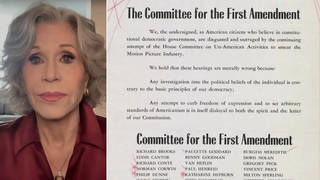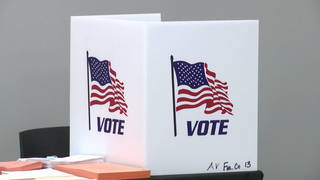
Guests
- Cariol Hornecommunity organizer and racial justice advocate in Buffalo, New York, where she previously worked as a police officer before being fired for stopping a white cop from choking a handcuffed Black man during an arrest in 2006.
As President Biden calls on Congress to enact new gun control measures, we go to Buffalo to speak with Cariol Horne, a racial justice advocate and former Buffalo police officer. She says the nation must address white supremacy, as well as gun control, following last month’s massacre in Buffalo, when a white supremacist attacked a grocery story, fatally shooting 10 people, all of whom were Black. “He victimized everyone in that community, even the people who arrived on the scene after it happened and watched the carnage that he left behind,” says Horne. “This is racist terrorism. We have to call it what it is.” Horne also talks about how she was fired from the Buffalo police force for stopping a white officer from choking a Black man who was handcuffed.
Transcript
AMY GOODMAN: In a rare primetime speech from the White House, President Biden called on Congress Thursday to ban assault weapons and expand background checks. Biden condemned the recent massacres in Buffalo, New York; Uvalde, Texas; and Tulsa, Oklahoma.
PRESIDENT JOE BIDEN: For god’s sake, how much more carnage are we willing to accept? How many more innocent American lives must be taken before we say “enough”? Enough. I know that we can’t prevent every tragedy. But here’s what I believe we have to do. Here’s what the overwhelming majority of the American people believe we must do. Here’s what the families in Buffalo and Uvalde, in Texas, told us we must do.
We need to ban assault weapons and high-capacity magazines — and if we can’t ban assault weapons, then we should raise the age to purchase them from 18 to 21 — strengthen background checks, enact safe storage law and red flag laws, repeal the immunity that protects gun manufacturers from liability, address the mental health crisis deepening the trauma of gun violence and as a consequence of that violence. These are rational, commonsense measures.
AMY GOODMAN: Shortly after President Biden spoke, the House Judiciary Committee passed a package of gun control measures known as the Protecting Our Kids Act. The full House will likely pass the legislation next week, but Republicans are expected to use the filibuster to reject the bills in the Senate.
We go now to Buffalo, New York, which is still in mourning after the May 14th massacre, when an 18-year-old white supremacist shot dead 10 Black people in a supermarket in the heart of Buffalo’s African American community. On Wednesday, the gunman was indicted on 25 counts, including domestic terrorism and murder as a hate crime. He pleaded not guilty. It was the first time that domestic terrorism charge was used in New York state history.
We’re joined right now by Cariol Horne. She’s a community organizer and racial justice advocate in Buffalo. She’s also a former Buffalo police officer. In 2008, she was fired from Buffalo’s police force after an incident two years earlier when she stopped a white police officer from choking a handcuffed Black man during an arrest. Last year a New York court vindicated Horne, making her eligible for back pay and pension benefits.
Cariol Horne, welcome back to Democracy Now! Our condolences on what has befallen your community, this horrific domestic terrorist attack. Can you start off by talking about where you were when the mass shooting took place? And describe what’s happened in Buffalo since.
CARIOL HORNE: I was at a meeting talking about the violence in our area. I actually was on my way to that meeting. I had just left my daughter’s graduation. And when I got to the meeting, I let, you know, one of the advocates that I work with — let him know what was going on as far as the shooting, the information that I had gotten.
We left that meeting and went over to the scene, where there were, like, bodies in the parking lot, a lot of chaos. People did not know where their loved ones were. The police didn’t seem to really — they weren’t communicating with each other. So, it was chaos. So I just tried to do what I could as far as a citizen, as a concerned person, a person who goes to that store, just a concerned community person. I tried to be like a buffer between the police and the people who were looking for their loved ones. The police wanted people to move. The families wanted to know if their loved ones were OK. And so, you know, eventually, there was a school that was opened for them to go to where they were finding out if their loved ones were in there or if they had been one of the victims.
AMY GOODMAN: Cariol Horne, I wanted to ask you about the white supremacist gunman, 18 years old, who has now just been charged for murdering the 10 people at the Tops supermarket. Again, he, on Wednesday, was indicted on 25 counts, including domestic terrorism and murder as a hate crime, the first time a domestic terror law has ever been used in New York. Can you respond to the charges? He pled not guilty.
CARIOL HORNE: Well, 25 charges were not enough. He victimized everyone in that community, even the people who arrived on the scene after it happened and watched the carnage that he left behind. In our community, we were already open targets, because a lot of people in the community have been banned from having weapons themselves, which I think that if we are banned from having weapons, then everyone should be banned from having weapons. I really don’t understand why someone would need a high-powered weapon in the first place. A lot of times they use the excuse of going hunting. Well, when you’re hunting people, I think that you need to just ban the weapons altogether. There is no reason why someone should have to have a high-powered weapon like that. And by the way, I have not been vindicated yet, so I don’t have a pension yet.
AMY GOODMAN: What do you mean? What happened in your case?
CARIOL HORNE: In my case, the decision to fire me was overturned, but I have not received a pension.
AMY GOODMAN: And what would it take to get one?
CARIOL HORNE: It would take them to issue a check.
AMY GOODMAN: Can you — I mean, your story is so incredible, in 2008, fired after you had stopped a fellow white officer — again, you’re a former Buffalo police officer. You stopped him from putting a Black man who was in handcuffs in a chokehold, and it was you who was fired. But I wanted to ask you about President Biden’s visit to Buffalo. He denounced the attack as an act of domestic terrorism and described white supremacy as a poison. You were among at least 200 people who gathered at a rally, leading the crowd in chants while calling for law enforcement to let Robin Gary inside the center where Biden was speaking — Robin Gary, who the shooter had put a gun to their head. Explain what happened.
CARIOL HORNE: Well, she begged for the life of her daughter. And instead of killing her, he did put the hot gun that he had just killed other people with to her head. At some point, she’ll be able to tell you her story herself. So, yeah, I want to respect that she’s not ready to talk about it yet.
But at the same time, you know, this is racist terrorism. We have to call it what it is. We have to deal with the race issue. We have to deal with the hate issue. We have it in the police department also — racism and, as far as I’m concerned, terrorism — because we saw them — when I say “them,” I mean the Buffalo police — they arrested the racist terrorist with no problems whatsoever, but then you have Black men dying at the hands of the police, and they have no weapon at all.
AMY GOODMAN: Well, let me ask you something. The Justice Department has announced it’s going to require federal agents to intervene if they see other law enforcement officers using excessive force — the first update to the DOJ’s use-of-force policy in nearly two decades. I mean, it sounds similar to exactly what you did back more than 15 years ago. Your response?
CARIOL HORNE: Yeah, so, the law that I wrote, Cariol’s Law, I wrote it in around 2015, 2016, and it was implemented in the city of Buffalo. Cariol’s Law, duty to intervene, which has six components — you can go to CariolsLaw.com — it needs to be a federal law. And there needs to be a federal registry, so that officers won’t go from one department to another department when they have exhibited bad behavior.
AMY GOODMAN: Are you encouraged by what the DOJ is doing? Of course, this only applies to federal agents. It wouldn’t apply to state or local police.
CARIOL HORNE: I am, but it should be all across the board. It should be a federal law. It should be a federal registry.
AMY GOODMAN: Your final comment, Cariol Horne? It is unbelievable to think that Buffalo attack just happened, the massacre there of 10 African Americans, more than half of them grandmothers, in the Tops supermarket, then Uvalde happens, but there were many in between. There have been dozens of mass shootings since Buffalo. You’re a former police officer. The issue of an assault weapons ban, can you talk directly about this, and the myth that police officers are, you know, for people carrying guns, that you’re a former officer who feels assault weapons ban is important?
CARIOL HORNE: Well, I don’t think that those officers in Texas thought that people should carry assault weapons, because they didn’t go into that school. And I don’t believe that anyone should carry an assault weapon. There’s no reason to, unless you want to slaughter a lot of people at one time.
AMY GOODMAN: Well, Cariol Horne, I want to thank you for being with us, Buffalo, New York, community organizer, racial justice advocate, remarkably brave former Buffalo police officer who tried to stop a white cop from choking a handcuffed Black man during an arrest in 2006. She was fired in 2008.
Coming up, we’ll speak to Chesa Boudin, the district attorney of San Francisco, facing a recall vote funded in part by the real estate industry, a Republican billionaire and top tech investors. Many see the recall as an attack on all progressive DAs across the country. Stay with us.












Media Options